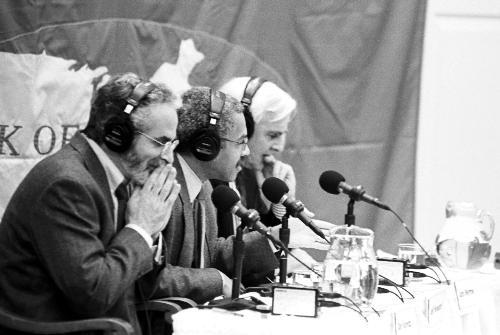
News
Progressive Labor Party Organizes Solidarity March With Harvard Yard Encampment

News
Encampment Protesters Briefly Raise 3 Palestinian Flags Over Harvard Yard

News
Mayor Wu Cancels Harvard Event After Affinity Groups Withdraw Over Emerson Encampment Police Response

News
Harvard Yard To Remain Indefinitely Closed Amid Encampment

News
HUPD Chief Says Harvard Yard Encampment is Peaceful, Defends Students’ Right to Protest
‘Talk of the Nation’ Broadcasts Show on Controversial Test From GSE

Wearing a green T-shirt and a silver necklace, a Braintree High School junior revealed yesterday to a panel of education experts—and to a national radio audience—that he found an error in Massachusetts’ most controversial standardized test.
To the applause of testing critics and Harvard graduate students, Mark A. “Pete” Peterson explained how a faulty geometry problem on the Massachusetts Comprehensive Assessment System (MCAS) perplexed him for 10 minutes—and how he felt MCAS did not really prepare him for life in any way.
Peterson’s appearance on the news analysis show “Talk of the Nation” was broadcast yesterday over National Public Radio (NPR) from the Askwith Forum at the Harvard Graduate School of Education (GSE).
But Peterson’s remarks ran counter to the comments of most panelists, who said standardized testing of some sort is useful for improving education. The radio show featured two panels in which school administrators and education researchers discussed high-stakes testing—a new trend in education policy that is popular with the business community and many politicians.
It is a keystone of the Bush administration’s recently passed education legislation.
In the first panel, entitled “Standardized Tests: What Are We Trying To Measure?” Jeffrey Howard, founder of The Efficacy Institute, a non-profit educational training and consulting company, urged that all students be held to high levels of academic performance.
“All of our kids have the ability to achieve a very high standard,” he said. “We shouldn’t be afraid of assessments.”
James A. Caradonio, superintendent of the Worcester Public Schools, said he agreed that tests are useful and necessary.
“Medical tests hurt too,” Caradonio said. “But if your doctor doesn’t use them, you aren’t too happy with her.”
But Linda F. Nathan, headmaster of the public Boston Arts Academy, who chose to home-school her own son rather than have him take the MCAS, disagreed. Nathan said testing does not correlate with high standards and ignores important aspects of education like creativity.
High-stakes testing also has adverse effects on minority students and students from poorer backgrounds, Nathan said.
Portfolios and exhibitions of students’ work over a period of time are better than a one-time test, she said.
But basic skills of literacy and numeracy are a necessary foundation on which to build more complex analytical skills, said Paul Reville, chair of the Massachusetts Education Reform Review Commission and lecturer at GSE.
Even testing proponents did not give full support to Bush’s plan to require states to administer annual tests to students.
“[Bush’s legislation] doesn’t say where these standards should be,” said Daniel Koretz, professor of educational assessment at GSE. “It flies in the face of what we know about how schools perform and set standards.”
Though panelists did most of the talking, the program was largely interactive.
A producer stationed at the back of the auditorium periodically cued NPR staffers at the front of the room, who signaled for the audience to begin and end applause. Certain audience members were also called on to ask questions they had submitted at the beginning of the program.
The panels also previewed the upcoming documentary Testing Our Schools, which will appear on the PBS television show “Frontline” and which features some of the panelists, as well as Peterson.
—Staff writer Stephanie M. Skier can be reached at skier@fas.harvard.edu
Want to keep up with breaking news? Subscribe to our email newsletter.
